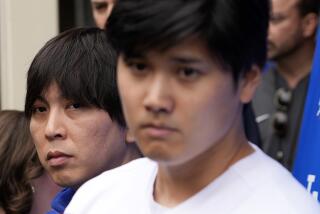Geisha Charges Writer’s Fiction Is Her Truth
- Share via
A 50-year-old former geisha from Kyoto, Japan, has filed suit against bestselling novelist Arthur Golden, claiming he exploited details of her life in the hugely successful 1997 novel “Memoirs of a Geisha.”
Mineko Iwasaki entered the breach of contract complaint Tuesday in U.S. District Court in New York City. The four-count action charges “unjust enrichment” and extensive copyright violations.
Iwasaki’s lawyer, Dorothy Weber of New York, said her client seeks a percentage of the profits of “Memoirs,” which spent more than a year on bestseller lists. The exact amount of damages is subject to determination by the court, but Weber said in an interview, “I think she’s entitled to half.” Iwasaki’s complaint alleges that the book has sold more than 4 million copies and generated sales of more than $10 million.
Stuart Applebaum, spokesman for Random House--parent corporation of Golden’s publisher, Alfred A. Knopf--called the lawsuit’s allegations “baseless and totally without merit.” He said Random House would “vigorously defend” Golden and the book.
In his acknowledgments, Golden writes, “I am indebted to one individual above all others. . . . To Mineko, thank you for everything.” In promotional interviews, Golden also made no secret of his reliance on interviews with the geisha from Kyoto.
The novel is written in the first-person voice of a girl from a small fishing village who is sold at age 9 into the structured and secretive life of a geisha. Golden’s book was hailed as a tour de force for its exploration, as John Burnham Schwartz of the New Yorker put it, of “a world so closed and foreign.”
The Washington Post called the book an “astonishing first novel,” all the more impressive because the author, “an American male in his early 40s,” manages to inhabit “the mind and voice” of a geisha.
A major point of contention in Iwasaki’s lawsuit is Golden’s depiction of how his heroine’s virginity was auctioned for a record price in Gion, Kyoto’s geisha district.
In Japan, this tradition is known as “mizuage,” with wealthy patrons bidding to end the virginity of a young woman as she formally assumes the role of a geisha.
Iwasaki’s complaint says that, in her life, that story is “patently untrue.” She contends her reputation was “tarnished” because readers assume that as Golden’s primary source about geisha life, the incident must have taken place.
According to her complaint, Iwasaki agreed to discuss geisha life with Golden on certain “express conditions.” The first was “complete anonymity for herself and her family.” The second was “total confidentiality regarding the personal stories and information she related from her life and career as well as her family’s experiences.”
There was no written agreement.
The lawsuit alleges that Iwasaki “opened her home to Golden” and permitted him to tape interviews with her for almost two weeks. The interviews “averaged more than 10 hours daily and total in excess of 100 hours,” the document states.
Iwasaki retired from geisha life in 1980. She is married to an artist and art restorer.
Weber said her client’s lawsuit is “absolutely not” a greedy gesture of vengeance by a woman feeling scorned. “She is saying, ‘This is my story, and he made a lot of money off it,’ ” Weber said.
In dueling interviews, Iwasaki and Golden have exchanged angry barbs. Weber said that in Japan, Iwasaki withdrew an official complaint when the publisher there agreed to remove her name from the book’s acknowledgments.
Applebaum, of Random House, said Golden would not comment until he had seen a copy of the complaint and consulted with his attorneys.
For her part, Weber called the book “so compelling, you really feel it is a true story, even though it is a novel.” Her client’s position, she said, is that “the reason it is so compelling is that it is her story.”
Asked if Iwasaki admired the novel, Weber replied, “You know, I haven’t asked her that question.”
More to Read
Sign up for our Book Club newsletter
Get the latest news, events and more from the Los Angeles Times Book Club, and help us get L.A. reading and talking.
You may occasionally receive promotional content from the Los Angeles Times.







